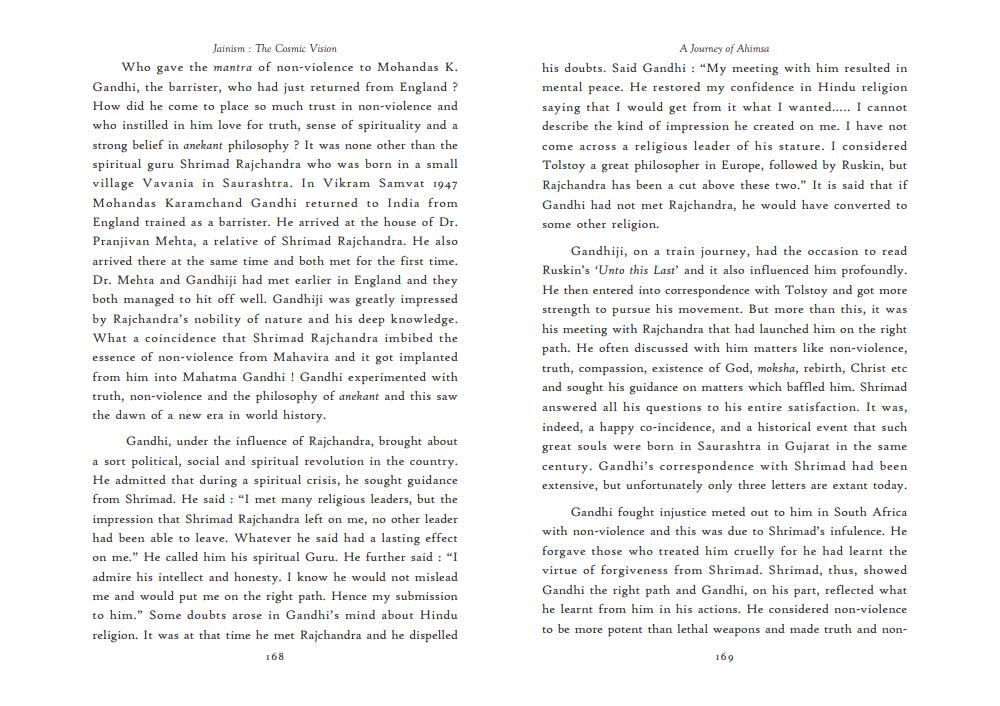________________
Jainism: The Cosmic Vision Who gave the mantra of non-violence to Mohandas K. Gandhi, the barrister, who had just returned from England ? How did he come to place so much trust in non-violence and who instilled in him love for truth, sense of spirituality and a strong belief in anekant philosophy ? It was none other than the spiritual guru Shrimad Rajchandra who was born in a small village Vavania in Saurashtra. In Vikram Samvat 1947 Mohandas Karamchand Gandhi returned to India from England trained as a barrister. He arrived at the house of Dr. Pranjivan Mehta, a relative of Shrimad Rajchandra. He also arrived there at the same time and both met for the first time. Dr. Mehta and Gandhiji had met earlier in England and they both managed to hit off well. Gandhiji was greatly impressed by Rajchandra's nobility of nature and his deep knowledge. What a coincidence that Shrimad Rajchandra imbibed the essence of non-violence from Mahavira and it got implanted from him into Mahatma Gandhi ! Gandhi experimented with truth, non-violence and the philosophy of anekant and this saw the dawn of a new era in world history.
Gandhi, under the influence of Rajchandra, brought about a sort political, social and spiritual revolution in the country. He admitted that during a spiritual crisis, he sought guidance from Shrimad. He said: "I met many religious leaders, but the impression that Shrimad Rajchandra left on me, no other leader had been able to leave. Whatever he said had a lasting effect on me." He called him his spiritual Guru. He further said: "I admire his intellect and honesty. I know he would not mislead me and would put me on the right path. Hence my submission to him." Some doubts arose in Gandhi's mind about Hindu religion. It was at that time he met Rajchandra and he dispelled
168
A Joumey of Ahimsa his doubts. Said Gandhi : "My meeting with him resulted in mental peace. He restored my confidence in Hindu religion saying that I would get from it what I wanted..... I cannot describe the kind of impression he created on me. I have not come across a religious leader of his stature. I considered Tolstoy a great philosopher in Europe, followed by Ruskin, but Rajchandra has been a cut above these two." It is said that if Gandhi had not met Rajchandra, he would have converted to some other religion.
Gandhiji, on a train journey, had the occasion to read Ruskin's 'Unto this Last' and it also influenced him profoundly. He then entered into correspondence with Tolstoy and got more strength to pursue his movement. But more than this, it was his meeting with Rajchandra that had launched him on the right path. He often discussed with him matters like non-violence, truth, compassion, existence of God, moksha, rebirth, Christ etc and sought his guidance on matters which baffled him. Shrimad answered all his questions to his entire satisfaction. It was, indeed, a happy co-incidence, and a historical event that such great souls were born in Saurashtra in Gujarat in the same century. Gandhi's correspondence with Shrimad had been extensive, but unfortunately only three letters are extant today.
Gandhi fought injustice meted out to him in South Africa with non-violence and this was due to Shrimad's infulence. He forgave those who treated him cruelly for he had learnt the virtue of forgiveness from Shrimad. Shrimad, thus, showed Gandhi the right path and Gandhi, on his part, reflected what he learnt from him in his actions. He considered non-violence to be more potent than lethal weapons and made truth and non
169




